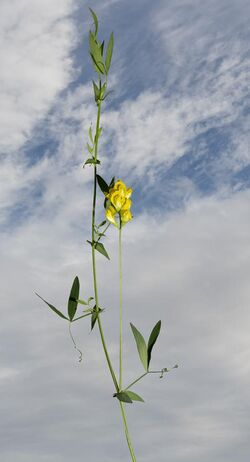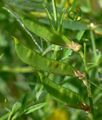Biology:Lathyrus pratensis
| Meadow vetchling | |
|---|---|

| |
| Scientific classification | |
| Kingdom: | Plantae |
| Clade: | Tracheophytes |
| Clade: | Angiosperms |
| Clade: | Eudicots |
| Clade: | Rosids |
| Order: | Fabales |
| Family: | Fabaceae |
| Subfamily: | Faboideae |
| Genus: | Lathyrus |
| Species: | L. pratensis
|
| Binomial name | |
| Lathyrus pratensis | |
Lathyrus pratensis or meadow vetchling,[1] yellow pea,[2] meadow pea[3] and meadow pea-vine, is a perennial legume that grows to 1.2 m in height.
The hermaphrodite flowers are pollinated by bees. As a perennial, this plant reproduces itself over many years, spreading out from the point it was introduced, especially in damp grassy areas. This plant has been propagated in the past as animal fodder.
Lathyrus pratensis is also a host plant for ovipositioning of the wood white butterfly (Leptidea sinapis).[4]
Description
Meadow vetchling is a perennial plant with a limp, unwinged stem that grows to 25 to 60 cm (10 to 24 in) and is erect and hairy. The leaves are alternate with short stalks and large stipules. The leaf blades are pinnate with a single pair of broad lanceolate leaflets with blunt tips, entire margins and a terminal unbranched tendril. The inflorescence has a long stem and a cluster of five to twelve yellow flowers, each 10 to 16 mm (0.4 to 0.6 in) long. These have five sepals and five petals and are irregular. The uppermost petal is known as the "standard", the lateral two as the "wings" and the lowest two are joined to form the "keel". There are ten stamens and a single carpel. The fruit is a long black pod. This plant flowers from June to August.[5]
-
Inflorescence
-
A close-up of the flowers
-
Vigorous green growth
-
Young fruit
-
Seeds
Distribution and habitat
Meadow vetchling is native to Europe and Asia, but has been introduced to other parts of the world.[6] In the United States, this plant is found primarily in the northwestern states of Oregon and Alaska. Its typical habitat is rough grassy places, broad-leaved woodland, forest margins, hedgerows and banks where it uses its tendrils to clamber over other vegetation.[5]
References
- ↑ (xls) BSBI List 2007, Botanical Society of Britain and Ireland, https://bsbi.org/download/3542/, retrieved 2014-10-17
- ↑ Stokoe, W.J.. The Observer's Book of Wild Flowers (1965 ed.). Frederick Warne & Co. Ltd.. p. 87.
- ↑ {{citation | mode = cs1 | title = Lathyrus pratensis | work = Germplasm Resources Information Network (GRIN) | url = | publisher = [[Organization:Agricultural Research ServAgricultural Research Service (ARS), United States Department of Agriculture (USDA) | access-date = 3 June 2015 }}
- ↑ Clarke, S. A.; Green, D. G.; Joy, J.; Wollen, K.; Butler, I. (2011-04-01). "Leptidea sinapis (Wood White butterfly) egg-laying habitat and adult dispersal studies in Herefordshire". Journal of Insect Conservation. 15 (1-2): 23–35. doi:10.1007/s10841-010-9300-8. ISSN 1366-638X.
- ↑ 5.0 5.1 "Meadow vetchling: Lathyrus pratentensis". NatureGate. http://www.luontoportti.com/suomi/en/kukkakasvit/meadow-vetchling.
- ↑ ILDIS: International Legume Database and Information System, http://www.ildis.org/LegumeWeb?genus=Lathyrus&species=pratensis, retrieved 3 June 2015
External links
Wikidata ☰ Q161639 entry
 |






